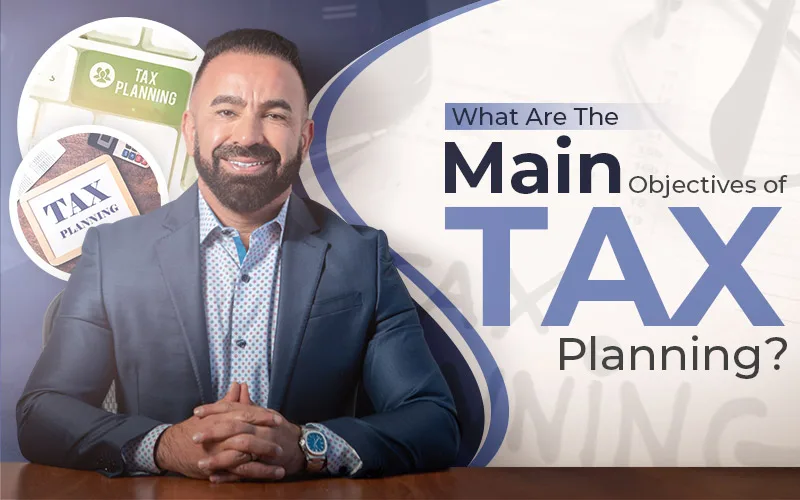
Tax planning. It’s an extremely useful and powerful tool that you can use to manage your personal financial future, as well as that of your business. At Jarrar & Associates CPAs, we understand that the purpose of tax planning is to minimize your tax burden, but are there any others? What are the main objectives of tax planning? Let’s look for a suitable answer together.
Effective tax planning strategies can result in large savings, improved cash flow, and better financial decision-making. Here, we’ll give you an overview of the key aspects of tax planning and how you and your business can benefit from it.
What is Tax Planning?
A tax advisor Los Angeles explains tax planning as a strategic approach to finance management, aiming to reduce tax liability within legal boundaries. This process involves analyzing financial situations and making informed decisions to reduce tax obligations.
Tax Planning Vs. Tax Evasion
Tax planning may seem like tax evasion, but it isn’t. It’s important for you to be able to differentiate between the two. Tax planning leverages legal methods to reduce tax burden, whereas tax evasion points to illegal avoidance of paying owed taxes. The IRS is forever ready to support taxpayers who rely on legitimate tax planning strategies to manage their tax obligations effectively.
Choose the Right CPA Firm for Your Business
Partner with Jarrar & Associates for expert tax, accounting, and financial guidance tailored to your needs—so you can focus on growth.
Importance for Individuals and Businesses
Individual Perks
Tax planning can lead to large savings for individuals. Effective tax planning helps you avoid common pitfalls and can result in substantial tax savings.
Business Perks
For a business, the impact of tax planning can be much more substantial. Proper tax planning reduces time constraints and leads to considerable tax savings.
Practical Strategies for Tax Planning
- Maximize Retirement Contributions: The first effective strategy worth mentioning involves maximizing retirement contributions. Last year and the year before, individuals aged 50 and above deposited up to $7,500 as catch-up contributions, which helped them reduce taxable income for those years.
- Strategic Timing of Income and Expenses: The second strategy involves timing income and expenses strategically. Self-employed people or small business owners might consider deferring income to the next tax year or accelerating expenses into the current year to reduce taxable income.
Tax Strategy Optimization
Our small business CPA Los Angeles has a few tricks up their sleeve for optimizing tax strategies.
Split Income to Lower Tax Bracket
Income splitting is quite effective for families. You can potentially cut down your overall tax liability by distributing income among family members.
Maximize Tax Deductions and Credits
Identify and take advantage of all available credits and deductions. It’s highly effective in reducing your tax bill. Common deductions include mortgage interest, charitable donations, and business expenses.
Strategically-Timed Income and Expenses
Timing strategies, such as deferring or accelerating income and expenses, can help you optimize tax planning by allowing you to pull the reins on your income. Business owners and self-employed individuals can defer income to the next tax year or accelerate expenses into the current year, significantly impacting their tax liability.
Utilize Retirement Accounts
Retirement accounts can offer great tax advantages. Traditional 401(k)s and IRAs allow you to contribute pre-tax money, reducing your current taxable income. Roth accounts, while funded with after-tax money, offer tax-free growth and withdrawals in retirement. This can be especially beneficial if you believe that you’ll be in a higher tax bracket in the future.
How Tax Planning Bolsters Financial Health
Here are a few ways tax planning can improve your financial health.
- Tax planning can significantly lower your overall tax liability. Decrease your taxable income through strategies like understanding your retirement accounts, leveraging tax-efficient investments, managing your tax bracket, and utilizing health savings accounts.
- Tax planning goes way beyond April 15th. It is an all-year-long strategy that can dramatically improve your cash flow. You can increase your take-home pay throughout the year by adjusting your withholdings depending on anticipated deductions and credits. This extra cash lets you pay down high-interest debt, invest in your business, or create an emergency fund.
- All-inclusive tax planning gives you a clearer picture of your overall financial situation. This clarity lets you make more informed decisions regarding investments, major purchases, and business moves.
- Tax planning has a strong impact on long-term wealth accumulation. You can accelerate the growth rate of your wealth by consistently minimizing your tax liability and redirecting the funds into investments.
- Finally, effective tax planning transforms your entire financial landscape. It’s not just about paying less in taxes, but about creating a robust fiscal foundation that supports your objectives and secures your future.
Conclusion
Tax planning is a powerful tool that lets you minimize tax liability and maximize wealth. The purpose of tax planning is to optimize your financial condition through strategically made decisions. Implementing effective tactics can lead to reduced tax burdens, improved cash flow, and better financial decision-making for both individuals and businesses.
Navigating tax laws and regulations isn’t easy, especially when you consider the fact that they keep changing with time. CPAs from CPA firms Los Angeles can prepare personalized tax strategies matching your financial goals. At Jarrar & Associates CPAs, we offer expert tax planning services tailored to the specific needs of our clients.
Tax planning demands an ongoing and proactive approach to changing circumstances. We believe you should start as soon as possible and review your tax strategy regularly to take advantage of opportunities as they come. There’s no use waiting until tax season to think about your tax strategy. Do it today and take control of your financial future.
Also Read: What Exactly Does a Tax Accountant Do?
FAQs
When should you start tax planning?
You should start tax planning at the beginning of the financial year. Early planning gives you more time to explore strategies, maximize deductions, and avoid last-minute tax surprises.
Can tax planning help with student loans?
Yes, tax planning can help you take advantage of student loan interest deductions and income-driven repayment tax considerations, helping you reduce your taxable income and manage your debt better.
How often should you update your tax strategy?
Your tax strategy should be reviewed annually or when major life changes occur—like marriage, home purchase, or job switch—to ensure your plan aligns with your financial goals and obligations.
Are there tax planning tools or software for individuals?
Yes, many online tools and apps can guide individuals in tax planning. However, complex situations may still benefit from personalized advice offered by experienced tax professionals or CPAs.
Is tax planning only for wealthy individuals or big businesses?
No, tax planning is useful for everyone. Even modest-income earners can benefit by maximizing deductions, managing withholdings, and planning retirement contributions for long-term financial wellness and reduced tax stress.



